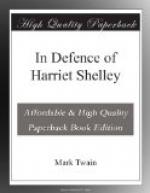Nothing could be handier than this; things will swim along now.
“Although now Shelley was coming to believe that his wedded union with Harriet was a thing of the past, he had not ceased to regard her with affectionate consideration; he wrote to her frequently, and kept her informed of his whereabouts.”
We must not get impatient over these curious inharmoniousnesses and irreconcilabilities in Shelley’s character. You can see by the biographer’s attitude towards them that there is nothing objectionable about them. Shelley was doing his best to make two adoring young creatures happy: he was regarding the one with affectionate consideration by mail, and he was assuaging the other one at home.
“Unhappy
Harriet, residing at Bath, had perhaps never desired
that
the breach between herself and her husband should be
irreparable
and complete.”
I find no fault with that sentence except that the “perhaps” is not strictly warranted. It should have been left out. In support—or shall we say extenuation?—of this opinion I submit that there is not sufficient evidence to warrant the uncertainty which it implies. The only “evidence” offered that Harriet was hard and proud and standing out against a reconciliation is a poem—the poem in which Shelley beseeches her to “bid the remorseless feeling flee” and “pity” if she “cannot love.” We have just that as “evidence,” and out of its meagre materials the biographer builds a cobhouse of conjectures as big as the Coliseum; conjectures which convince him, the prosecuting attorney, but ought to fall far short of convincing any fair-minded jury.
Shelley’s love-poems may be very good evidence, but we know well that they are “good for this day and train only.” We are able to believe that they spoke the truth for that one day, but we know by experience that they could not be depended on to speak it the next. The very supplication for a rewarming of Harriet’s chilled love was followed so suddenly by the poet’s plunge into an adoring passion for Mary Godwin that if it had been a check it would have lost its value before a lazy person could have gotten to the bank with it.
Hardness, stubbornness, pride, vindictiveness—these may sometimes reside in a young wife and mother of nineteen, but they are not charged against Harriet Shelley outside of that poem, and one has no right to insert them into her character on such shadowy “evidence” as that. Peacock knew Harriet well, and she has a flexible and persuadable look, as painted by him:
“Her manners were good, and her whole aspect and demeanor such manifest emanations of pure and truthful nature that to be once in her company was to know her thoroughly. She was fond of her husband, and accommodated herself in every way to his tastes. If they mixed in society, she adorned it; if they lived in retirement, she was satisfied; if they




